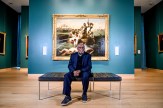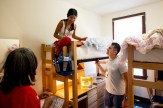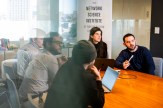Northeastern University Professor Creates Interactive Speech Therapy Tool for Children
visiBabble Uses Animation and Games to Encourage Early Speech Development
Contact: John Natale at 617-373-2802
(1-23-07) BOSTON, Mass. – Just as children first learn to crawl in order to walk, they also learn to babble in order to talk. For those who struggle with babbling due to speech disorders stemming from physical impairment, Northeastern University professor Dr. Harriet Fell has created visiBabble, an interactive digital tool that encourages repetition of foundational sounds and syllables through the incentive of visually-stimulating animation and games.
Through an attached microphone, visiBabble listens for children to utter sounds that are fitting for their age range. Upon detecting these sounds, it rewards users with entertaining moving images ranging from a six-piece puzzle that solves itself as a child repeats multi-syllabic babbles to a fireworks display that gains momentum as a child uses consonant-like sounds. As users experiment with speech, they draw a link between the sounds they create and events that take place on visiBabble’s LCD screen.
Based on a child’s individual needs, visiBabble can be set to encourage dual-syllabic sounds, multi-syllabic sounds, consonant-like sounds, or upward pitch sounds that promote diverse tonal expression. To keep parents involved in their child’s development, visiBabble records the progress and sophistication of babbling, in the context of precision, range, and complexity of articulation. Level of difficulty can be increased as the user progresses.
The underlying research for visiBabble was funded by a series of NIH grants awarded to Dr. Fell from 2002 to present date. She is currently developing a range of visiBabble prototypes, including a crib toy and a clinical version that runs on a therapist’s computer.
Throughout visiBabble’s development, Dr. Fell has worked closely with scientists at Speech Technology and Applied Research Corp. (STAR), a Bedford, Massachusetts-based firm and Dr. Cynthia Cress, a University of Nebraska, Lincoln professor who currently supervises visiBabble field-testing involving children with disabilities.
About Northeastern: Founded in 1898, Northeastern University is a private research university located in the heart of Boston. Northeastern is a leader in interdisciplinary research, urban engagement, and the integration of classroom learning with real-world experience. The university’s distinctive cooperative education program, where students alternate semesters of full-time study with semesters of paid work in fields relevant to their professional interests and major, is one of the largest and most innovative in the world. The University offers a comprehensive range of undergraduate and graduate programs leading to degrees through the doctorate in six undergraduate colleges, eight graduate schools, and two part-time divisions. For more information, please visit www.northeastern.edu.





